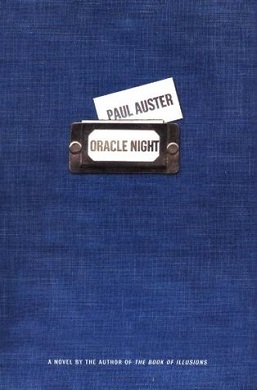
I’ve been meaning to read Auster’s novels for a while and even have a couple of his books on my to-be-read shelf. However, I decided to start with this short one from the library.
As Brooklyn novelist Sidney Orr recovers from a life-threatening illness, he begins to walk around his neighborhood. Attracted to a Chinese stationery shop he’d never noticed before, he is drawn to a blank notebook with a blue cover. For the first time since the onset of his illness, he enters his tiny writing room and begins writing in the notebook.
The story pouring out of him, which he titles Oracle Night, tells of a New York editor who one day simply up and leaves his life, traveling by random chance to St. Louis. There Nick meets Ed, an elderly cab driver who is in poor health. Finding his wife—thinking him dead—has canceled his credit cards, Nick begins working for Ed, helping him reorder his collection of telephone books stored in an underground bunker.
Meanwhile, Sidney’s marriage is suffering; his wife Grace is behaving oddly. His friend and mentor John Trause, twenty-some years older and a longtime friend of Grace and her family, is acting strange as well. Trause (yes, an anagram) had been the one to suggest the story behind Oracle Night to Sidney, based on a brief incident in The Maltese Falcon. Even more mysterious things begin to happen, such as Grace dreaming about Sidney’s story and Sidney himself disappearing from his study when he is certain he’s been there all along.
Auster includes footnotes of varying length, usually containing backstory about a person or incident, which amused me. I also enjoyed the many literary references. So it was fun to read, though the characters were rather flat, and the novel more of a production to appreciate than a story to immerse oneself in. The similarities between the characters and Auster himself and the whole fiction-versus-reality theme seem a bit old hat, even for 2003 when this novel was first published.
In the summary above I’ve barely scratched the surface of the many interwoven layers of plot in this story within story within story. I did appreciate the resulting semi-chaos and the way it reflected Sidney’s growing distrust of reality. However, the various layers never quite cohered, and the turn to melodrama at the end rather ruined the book for me.
Will I try another Auster novel? Sure. Can you recommend a good one for me to read next?